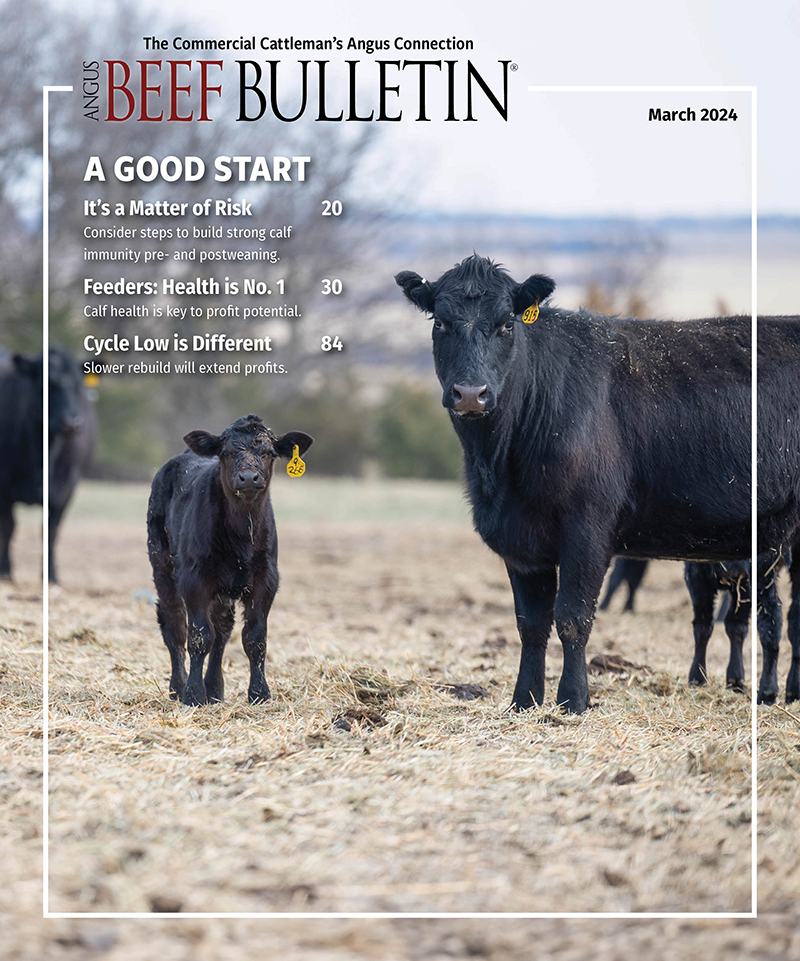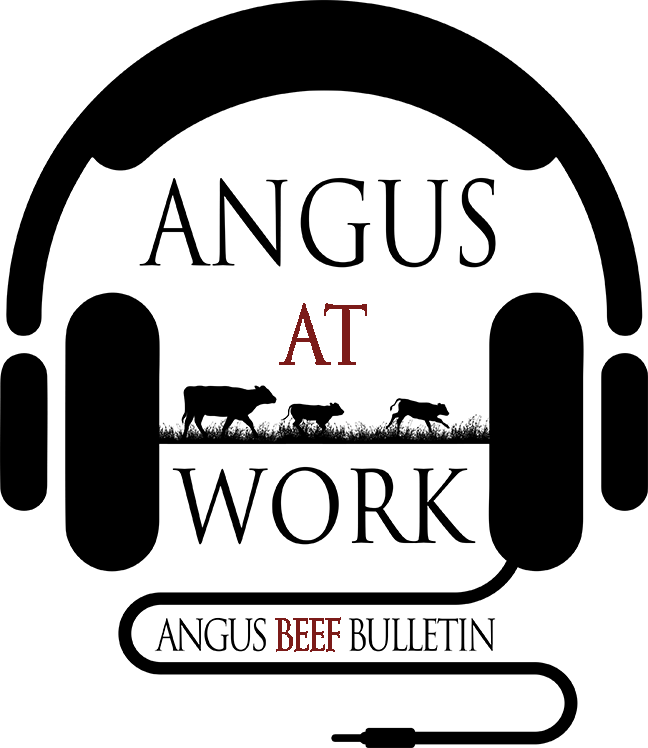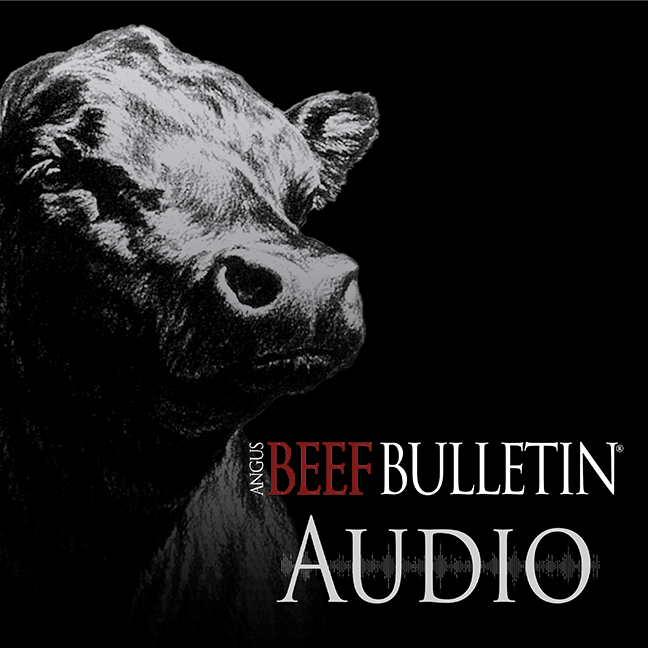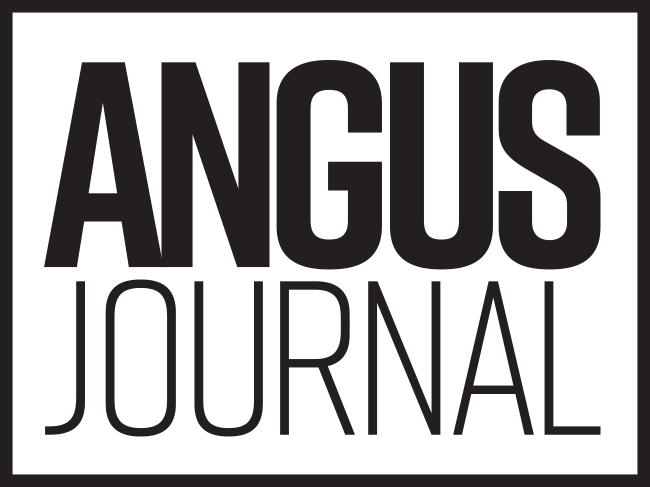News & Notes
News from around the country pertinent to farmers and ranchers.
This month’s “News & Notes” features updates on planting intentions; highlights of the Quarterly Hogs & Pigs report; availability of the Iowa Beef Center’s feedlot webinar series; CAB scholarship application deadlines; and details for two upcoming meetings — one in Texas and one in Missouri.
U.S. farmers expect to plant less corn, more soybean acres
Producers surveyed across the United States intend to plant 90.0 million acres of corn in 2024, down 5% from last year, according to the most recent Prospective Plantings report released by USDA’s National Agricultural Statistics Service (NASS).
Planted acreage intentions for corn are down or unchanged in 38 of the 48 estimating states. Acreage decreases of 300,000 acres or more from last year are expected in Illinois, Indiana, Iowa, Minnesota, Missouri, Ohio, South Dakota and Texas. If realized, the planted area of corn in Arizona and Oregon will be the largest on record.
Soybean growers intend to plant 86.5 million acres in 2024, up 3% from last year. Acreage increases from last year of 100,000 acres or more are expected in Arkansas, Illinois, Indiana, Iowa, Kentucky, Louisiana, Michigan, Minnesota, Missouri, North Dakota, Ohio and South Dakota. Record-high acreage is expected in Kentucky and New York.
The Prospective Plantings report provides the first official, survey-based estimates of U.S. farmers’ 2024 planting intentions. NASS’s acreage estimates are based on surveys conducted during the first two weeks of March from a sample of nearly 72,000 farm operators across the nation. Other key findings in the report are:
- All wheat planted area for 2024 is estimated at 47.5 million acres, down 4% for comparable states from 2023.
- Winter wheat planted area, at 34.1 million acres, is down 1% from the previous estimate and down 7% from last year for comparable states.
- Area planted to other spring wheat for 2024 is expected to total 11.3 million acres, up 1% from 2023.
- Durum wheat planted is expected to total 2.03 million acres for 2024, up 22% from last year for comparable states.
- All cotton planted area for 2024 is expected to total 10.7 million acres, 4% above last year.
NASS also released the quarterly Grain Stocks report to provide estimates of on-farm and off-farm stocks as of March 1. Key findings in that report include:
- Corn stocks totaled 8.35 billion bushels (bu.), up 13% from the same time last year. On-farm corn stocks were up 24% from a year ago, while off-farm stocks were down 1%.
- Soybeans stored totaled 1.85 billion bu., up 9% from March 1, 2023. On-farm soybean stocks were up 24% from a year ago, while off-farm stocks were down 3%.
- All wheat stored totaled 1.09 billion bu., up 16% from a year ago. On-farm all wheat stocks were up 20% from last year, while off-farm stocks were up 14%.
- Durum wheat stored totaled 36.6 million bu., up 2% from March 1, 2023. On-farm durum stocks were up 10% from a year ago, while off-farm stocks of durum wheat were down 5%.
The Prospective Plantings, Grain Stocks and all other NASS reports are available online at www.nass.usda.gov.
United States hog inventory up 1%
As of March 1, there were 74.6 million hogs and pigs on U.S. farms, up 1% from March 2023 but down 2% from Dec. 1, 2023, according to the Quarterly Hogs & Pigs report published March 28 by NASS.
Other key findings in the report were:
- Of the 74.6 million hogs and pigs, 68.6 million were market hogs, while 6.02 million were kept for breeding.
- Between December 2023 and February 2024, 33.1 million pigs were weaned on U.S. farms, up 2% from the same period one year earlier.
- From December 2023 through February 2024, U.S. hog and pig producers weaned an average of 11.53 pigs per litter.
- U.S. hog producers intend to have 2.92 million sows farrow between March and May 2024, and 2.99 million sows farrow between June and August 2024.
- Iowa hog producers accounted for the largest inventory among the states, at 25.2 million head. Minnesota had the second largest inventory at 9.10 million head. North Carolina was third with 7.40 million head.
The Quarterly Hogs & Pigs report and all other NASS reports are available online at www.nass.usda.gov.
IBC feedlot webinar series now available on YouTube
The Iowa Beef Center (IBC) hosted a weekly feedlot webinar series in February focused on hot topics and common questions fielded from Iowa feedlot producers. All five webinar sessions are now available in the Feedlot Webinar Series playlist on the Iowa Beef Center YouTube channel.
Iowa State University extension program specialist Beth Reynolds said the series provided timely, relevant and practical information for those who operate and are involved in feedlots. Each session focused on a specific topic presented by an expert in that area.
“For instance, DocTalk host and feedlot consultant Dan Thomson led the foot health and lameness session,” she said. “He helped producers understand the impact facility design and handling has on lameness, and how to find effective strategies to reduce the impact of lameness in their yard.”
Erika Lundy-Woolfolk, Iowa State extension beef specialist, hosted the series and said the session on pros and cons of feedlot types presented by Dan Loy, former IBC director and feedlot specialist, drew much attention.
“He provided research-based information on how management and various facility types can have performance and financial impacts on feedyards,” she said. “This was particularly timely, as 60% of live attendees who participated in our poll noted that they were planning on renovating or building new facilities in the next five years.”
The other three webinar topics and presenters were:
- The value of utilizing necropsies with Terry Engelken, Iowa State veterinary diagnostic and production animal medicine;
- Beef cattle market outlook and risk management strategies with Lee Schulz, Iowa State extension livestock economist; and
- A beef-on-dairy research update with IBC research scientist Garland Dahlke.
Attendees of the five livestream sessions represented eight countries and 18 states, and included a diverse mix of feedlot owners, consultants, industry/veterinarian professionals, and feedlot employees. Combined, this group influences 295,000 head of cattle annually.
Applications open for CAB scholarships
Continuing to support the next generation of leaders in the beef industry, Certified Angus Beef (CAB) will give a record $100,000 in scholarships across three categories this year. College students with a passion for agriculture and a drive to innovate are encouraged to apply.
The Colvin Scholarship Fund, named in honor of Louis “Mick” Colvin, co-founder and former executive director of CAB, aims to empower students who are dedicated to advancing the beef industry. During its two-decade legacy, the fund has supported more than 100 students pursuing their educational and professional goals in agriculture. In 2023, CAB awarded $81,500 to 23 scholars.
“The Colvin Scholarship Fund represents our commitment to nurturing the future leaders of the beef industry,” says Danielle Matter, director of brand experience and education. The 2024 Colvin Scholarship supports the next generation of ag leaders who are dedicated to preserving farm and ranch traditions, researching and developing improved beef quality practices and devoting their careers, studies and activities to making the beef industry even better.
The production agriculture, undergraduate and graduate scholarship categories each have unique requirements, including essay questions, résumés and letters of recommendation.
Applications for the 2024 Colvin Scholarship will undergo a comprehensive evaluation process, considering factors based upon the applicants’ academic achievements, extracurricular involvement, communication skills and commitment to the beef industry. A selection committee composed of industry experts and CAB representatives will carefully review each application to identify the most deserving candidates.
Scholarship recipients will receive financial support and the opportunity to connect with industry leaders and mentors. Top-place winners in each category will receive $7,500 and an all-expense-paid trip to the 2024 CAB Annual Conference in Verona, N.Y., providing them with a platform to connect with professionals from across the beef industry.
Applications for the 2024 Colvin Scholarship will close April 30. Interested students who live in the United States or Canada can apply. Learn more and apply by visiting https://www.certifiedangusbeef.com/recruiting/.
Texas A&M AgriLife Hemphill County Beef Conference April 23-24
Themed “Better Ranching for Better Life,” the Texas A&M AgriLife Hemphill County Beef Conference is set for April 23-24 in the Jones Pavilion, 1101 N. Sixth St., Canadian, Texas.
While many ranchers will still be reeling from the devastation left in the path of the Smokehouse Creek Fire, Andy Holloway, Texas A&M AgriLife Extension Service agriculture and natural resources agent for Hemphill County, says the saying “the show must go on” may be as important as ever.
“We will be addressing everything from the future of the cattle market to what is in store with the weather and risk management, all of which will play an important role in the recovery of our ranchers here in our county and across the industry,” Holloway says.
He also assured participants that despite the severe damage in parts of Canadian, they will still be able to accommodate the expected doubling of the town’s size when participants arrive.
Registration, at $150 per person and spouse tickets at $125, is open online at www.hemphillcotxbeef.com, by calling 806-323-9114, or by stopping at the AgriLife Extension office at 10965 Exhibition Center Road, Canadian.
A new feature with the Texas Beef Council will include chef presentations in a new tent dedicated to beef products developed by Texas Beef Checkoff dollars, including a tasting opportunity of some of the developments to enhance value.
A record number of trade show exhibitors, more than 100, are expected to be in attendance. A total of three beef meals are included in the registration price.
The Hemphill County Ag Committee will bring in Kayleigh McEnany, former White House press secretary and current co-host of Outnumbered on the Fox News Channel, as the keynote speaker April 23. McEnany’s topic will be “America’s Heart and Soul is Under Attack.”
Additionally, Holloway says the conference will offer 12 sessions on everything from financing, regenerative pasture management and new technology to beef cattle genetics, beef quality and what future production might look like.
Management-intensive Grazing School in early May
University of Missouri (MU) Extension will host a Management-intensive Grazing (MiG) School in cooperation with several agencies May 7-9 in St. Clair County.
“Efficient forage management and utilization is important to the profitability of a livestock operation,” says Patrick Davis, MU Extension livestock field specialist. “The best way to promote efficient forage management and utilization in a livestock operation is by incorporating management-intensive grazing practices.”
MU Extension, the USDA Natural Resources Conservation Service (NRCS) and the Missouri Forage and Grasslands Council are cooperating to provide the MiG School to livestock producers May 7-9 at the Forest Park Building, 206 E. Fifth St., Appleton City. Classes run 9 a.m. to about 4:30 p.m. all three days.
“This school is applicable to and will provide education in livestock and forage management for all grazing species, though cattle will be emphasized,” says Davis.
Educational topics include:
- the “art and science” of grazing;
- soils, soil management and fertility;
- plant growth, forage quality and persistence;
- fencing and water systems;
- matching livestock and forage resources;
- meeting nutritional needs of livestock from pasture;
- layout and design of grazing systems;
- economics of management-intensive grazing; and
- outdoor field exercises and tour of producers’ farms.
The program is required to receive Missouri Soil and Water Conservation District cost-share funding and may help in receiving NRCS cost-share funding for grazing system development. Cost is $200 per person and $100 per additional person from the same farm not needing materials. Fee includes materials, lunches and refreshments during the event. Registration and payment by May 2 are required to attend the Management Intensive Grazing School. Register at https://shorturl.at/afwQX. For questions, contact the MU Extension Center in St. Clair County at 417-646-2419 or Davis at davismp@missouri.edu.
Editor’s note: “News & Notes” is compiled from news releases and announcements from various organizations. To submit an item for consideration for a future column, email Shauna Hermel, editor at shermel@angus.org.



